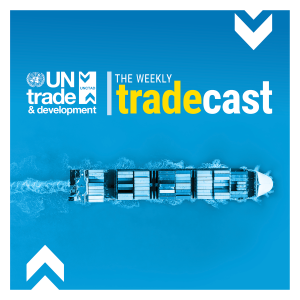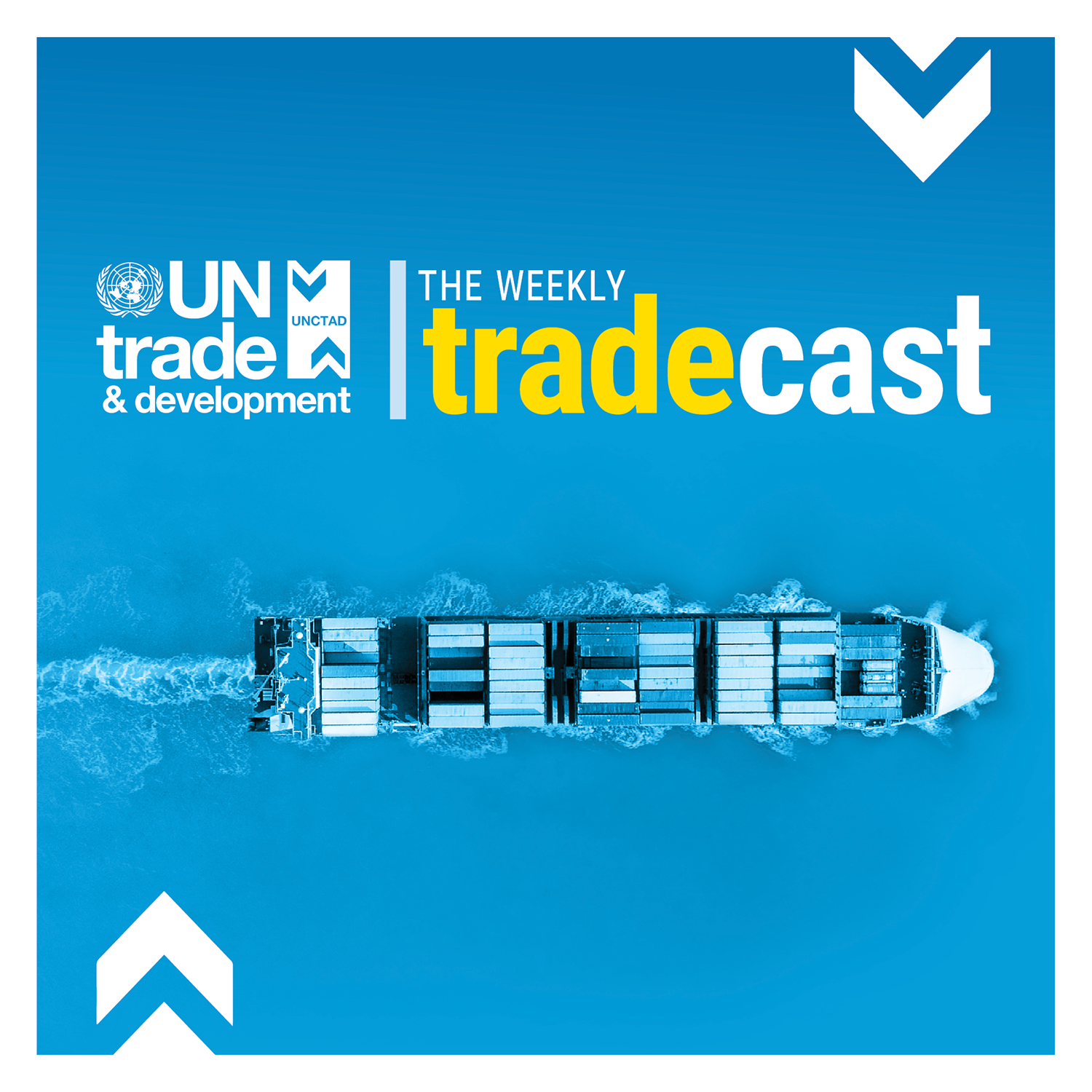Episodes
Episodes



Thursday Feb 09, 2023
Thursday Feb 09, 2023
As the United Nations marks the International Day of Women and Girls in Science, this episode of The Weekly Tradecast talks about bridging the gender divide with two young researchers from Egypt and the Philippines.
The STEM areas – science, technology, engineering and mathematics – offer enormous opportunities for women. But attitudes persist that these are fields mainly for men, often leaving women under-represented or excluded.
Menatallah Elserafy and Fresthel Climacosa just completed a one-month fellowship doing cutting-edge health research in Japan. Started in 2020, the Young Female Scientist Program is run by UNCTAD and Okayama University to support women in developing countries by sharing skills, knowledge and inspiration.
Listen in to the two young scientists to hear more about their time in Japan, their research work and their plans for the future.



Thursday Feb 02, 2023
31. Multinational manoeuvres: How rule-shopping by big companies dilutes development
Thursday Feb 02, 2023
Thursday Feb 02, 2023
This episode of The Weekly Tradecast looks at how the behaviour of multinational companies affects development with Anastasia Nesvetailova, head of UNCTAD’s macroeconomic and development policies branch.
Over the past few decades, the globalization of production has brought many benefits. But there’s a dramatic contrast in the way foreign direct investment is organized between the Global North and the Global South.
New UNCTAD analysis looks at how big corporations take advantage of different rules in different countries to avoid regulation and scrutiny. For developing countries, that can mean lower revenues and fewer opportunities.
Tune in to UNCTAD’s Anastasia Nesvetailova to hear how countries can keep investment flowing without losing out on long-term development.



Thursday Jan 26, 2023
30. Crypto collapse: Is there still a future for digital currencies?
Thursday Jan 26, 2023
Thursday Jan 26, 2023
This episode of The Weekly Tradecast talks about the future of cryptocurrencies with UNCTAD economist Marina Zucker.
Regulators in various countries are now investigating after FTX – one of the world’s biggest cryptocurrency exchanges – filed for bankruptcy protection in late 2022.
As claims swirl, the high-profile company could owe repayments to as many as one million people. Whether they get the money is another question.
After other big bankruptcies before and after FTX’s unexpected collapse, digital currencies are facing tougher questions around volatility, security, safety and trust. With the impact hitting investors and other crypto companies, calls are also growing louder for tougher rules.
Tune in to this episode to find out what could happen and should happen with digital assets.



Thursday Jan 19, 2023
29. Dirty money: How it undermines the global economy and how we can fix it
Thursday Jan 19, 2023
Thursday Jan 19, 2023
In this episode of The Weekly Tradecast, we talk about illicit financial flows with UNCTAD’s officer in charge of statistics, Anu Peltola.
Dirty money from terrorists and criminal groups fuels violence and instability, while the Panama Papers have exposed how secretive offshore companies allow corrupt politicians and the wealthy to stash away huge amounts.
Apart from being illegal, the murky transactions deprive governments of revenues to invest in hospitals, education and services.
Tune in to Anu to find out why illicit financial flows are so damaging and how we can fix the problem.



Thursday Jan 12, 2023
28. The perils of greenwashing: UNCTAD calls out false climate claims
Thursday Jan 12, 2023
Thursday Jan 12, 2023
This episode of The Weekly Tradecast is talking about greenwashing with lawyer Arnau Izaguerri Vila from UNCTAD’s competition and consumer policies branch.
As concerns keep growing about damage to the environment, it's good for businesses to be seen as green. But what happens when companies go too far by exaggerating the “eco-friendly” and “sustainable” credentials of their products and services?
That's greenwashing – and it comes at a cost to consumers, investors and our planet.
Listen to Arnau to find out what to do about misleading green claims to help make real progress on protecting the environment.



Thursday Jan 05, 2023
27. A hungry future: The climate change risks to food security
Thursday Jan 05, 2023
Thursday Jan 05, 2023
This episode of the Weekly Tradecast talks about how climate change endangers our food supplies across the globe with Janvier Nkurunziza, head of UNCTAD's commodities branch.
The Horn of Africa is on the verge of famine. We’ve had devastating floods in China and Pakistan and heat waves across much of Europe this year.
As global warming increases, so does the likelihood of extreme weather, withering crops and depleted livestock. It affects the one thing we can’t do without – food – and the problems will only get worse unless we really tackle carbon emissions.
In just 30 years, the world will have 2 billion more people to feed. How can we ensure there is enough for all to eat and that food can be produced in a climate friendly way? Listen to UNCTAD’s Janvier Nkurunziza to find out.



Thursday Dec 29, 2022
26. Better or worse? Looking ahead to 2023 with UNCTAD chief Rebeca Grynspan
Thursday Dec 29, 2022
Thursday Dec 29, 2022
In this special episode of the Weekly Tradecast, we’re talking to UNCTAD Secretary-General Rebeca Grynspan – and looking back at the many challenges of this year and ahead to 2023.
This year has been unprecedented. The recovery from COVID-19 is still shaky. The war in Ukraine has ramped up the costs of food and energy. Inflation is high, interest rates are rising, and many countries face distress over their debts.
The impact is worst for developing countries, but many developed economies are also feeling the strain.
One bright spot was the renewed flow of vital food supplies from Ukraine and Russia in deals brokered by the UN and Türkiye.
Can the world resolve the multiple crises in 2023? What will it take to make progress on development and climate goals?
Tune in to UNCTAD Secretary-General Rebeca Grynspan to find out her priorities – and hopes – for the new year.



Friday Dec 23, 2022
25. Africa online: Women tech entrepreneurs reshape the future
Friday Dec 23, 2022
Friday Dec 23, 2022
In this episode of The Weekly Tradecast, we talk to two “eTrade for Women" advocates helping to bridge the gender and digital divide.
Birame Sock from Senegal and Damilola Olokesusi from Nigeria tell us about the massive opportunities for women in Africa’s emerging technology sector.
But the stigma persists that tech is a "male industry", leaving women under-represented and often excluded.
How can Africa better support women to set up viable tech businesses that create decent jobs and economic growth? Tune in to this episode to find out.






